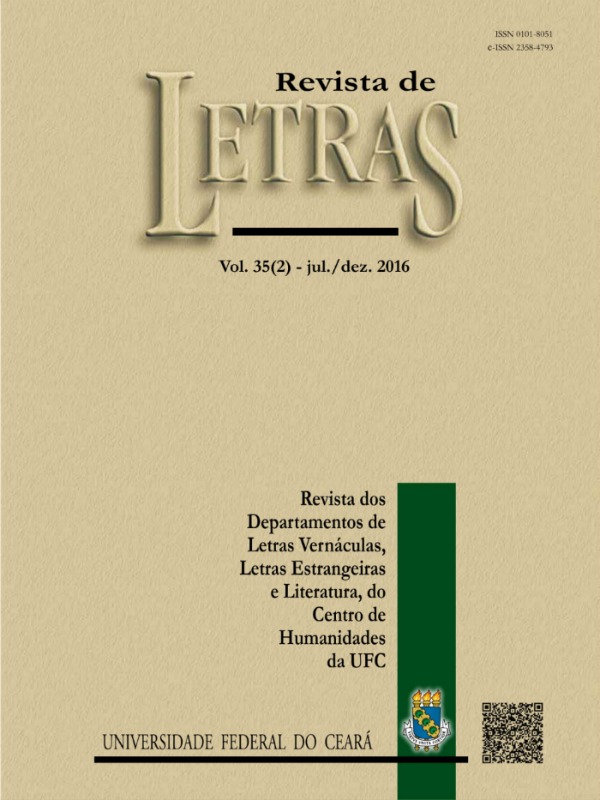A ALTERNÂNCIA DAS FORMAS PRONOMINAIS TU, VOCÊ E O(A) SENHOR(A) NA FUNÇÃO DE SUJEITO NO PORTUGUÊS FALADO EM CAMETÁ-ESTADO DO PARÁ / THE ALTERNATION OF THE PRONOMINAL FORMS TU, VOCÊ, AND O(A) SENHOR(A), IN THE SUBJECT FUNCTION, IN PORTUGUESE SPOKEN IN CAMETÁ - STATE OF PARÁ
Palavras-chave:
Pronomes de referência à segunda pessoa, Variação linguística, Relação social, simétrica e assimétricaResumo
RESUMO
Este artigo apresenta um estudo sobre a alternância das formas pronominais de referência à segunda pessoa, na função de sujeito, Tu/Você/o(a) Senhor(a) no português falado na zona urbana do município de Cametá-Pará. Adota como quadro teórico-metodológico a Teoria da Variação e Mudança Linguística. Objetiva analisar o papel de fatores linguísticos (tipo de frase, tempo do verbo, referência genérica e específica do pronome) e fatores extralinguísticos/sociais (sexo/gênero, faixa etária e relações hierárquicas) na motivação do comportamento variável de tu, você e o(a) senhor(a). O corpus da pesquisa contém dados de gravações colhidos a partir das interações face a face de 08 (oito) grupos focais, cada um constituído por 04 (quatro) sujeitos participantes, todos cametaenses, totalizando 32 participantes. Porém destes, apenas 08 (oito) foram objeto de análise deste trabalho, que são nossos informantes-base, na faixa etária entre 21 a 29 e de 34 a 44 anos, do sexo/ gênero (masculino e feminino) e todos com nível superior. Na fala destes 08 (oito) informantes- -base obtivemos 223 dados, estes foram analisados pelo GOLDVARB. Os resultados apontaram 105 ocorrências da forma pronominal tu, 110 de você e apenas 08 da forma o(a) senhor(a), o que corresponde, respectivamente, a 47,1%, 49,5% e 3,2% dos dados considerados na pesquisa. Observamos que a forma tu é favorecida pela referência direta e específica ao interlocutor, pelo frase tipo exclamativa e é usado mais pelas mulheres, principalmente em interações sociais simé- tricas; enquanto a forma você, tem o uso motivado pela referência específica para um grupo e é usada principalmente entre falantes de hierarquias sociais diferentes (status superior para inferior). Isso, nesta análise, de cunho parcial, nos leva a perceber que esta forma é marca de distanciamento social e tratamento não íntimo entre os falantes na comunidade analisada.
ABSTRACT
This article presents a study on the alternation of pronominal forms of reference to the second person, in the function of subject, Tu/Você/o(a) Senhor(a) in Portuguese spoken in the urban area of the municipality of Cametá-Pará. It adopts as theoretical-methodological framework the Theory of Variation and Linguistic Change. It aims to analyze the role of linguistic factors (type of sentence, verb tense, generic and pronoun reference) and extralinguistic/social factors (gender/gender, age group and hierarchical relationships) in the motivation of the variable behavior of tu, você and o(a) senhor(a). The research corpus contains data from recordings collected from the face-to-face interactions of 08 (eight) focus groups, each composed of four (4) participant subjects, all of them came from Portugal, totaling 32 participants. However, only 08 (eight) were the subject of analysis of this study, which are our base informants in the age group between 21 to 29 and 34 to 44 years, gender (male and female) and all with a higher level. In the speech of these 08 (eight) base informants we obtained 223 data, these were analyzed by GOLDVARB. The results showed 105 occurrences of the pronominal form tu, 110 of você and only 08 of the form o(a) senhor(a), which correspond, respectively, to 47.1%, 49.5% and 3.2% of percentage of the data considered in the research. We observe that form tu were favored by the direct and specific reference to the interlocutor, by the exclamatory phrase and is used more by women, especially in symmetrical social interactions. While você form, it has its use motivated by the specific reference to a group and is mainly used among speakers of different social hierarchies (top to bottom status), which in this partial analysis leads us to realize that this form is a brand Social distancing and non-intimate treatment among the speakers in the analyzed community
Downloads
Downloads
Publicado
Como Citar
Edição
Seção
Licença
Autores que publicam nesta revista concordam com os seguintes termos:- Autores mantêm os direitos autorais e concedem à revista o direito de primeira publicação, com o trabalho simultaneamente licenciado sob a Licença Creative Commons Attribution que permite o compartilhamento do trabalho com reconhecimento da autoria e publicação inicial nesta revista.
- Autores têm autorização para assumir contratos adicionais separadamente, para distribuição não-exclusiva da versão do trabalho publicada nesta revista (ex.: publicar em repositório institucional ou como capítulo de livro), com reconhecimento de autoria e publicação inicial nesta revista.
- Autores têm permissão e são estimulados a publicar e distribuir seu trabalho online (ex.: em repositórios institucionais ou na sua página pessoal) a qualquer ponto antes ou durante o processo editorial, já que isso pode gerar alterações produtivas, bem como aumentar o impacto e a citação do trabalho publicado (Veja O Efeito do Acesso Livre).

.png)





.png)
